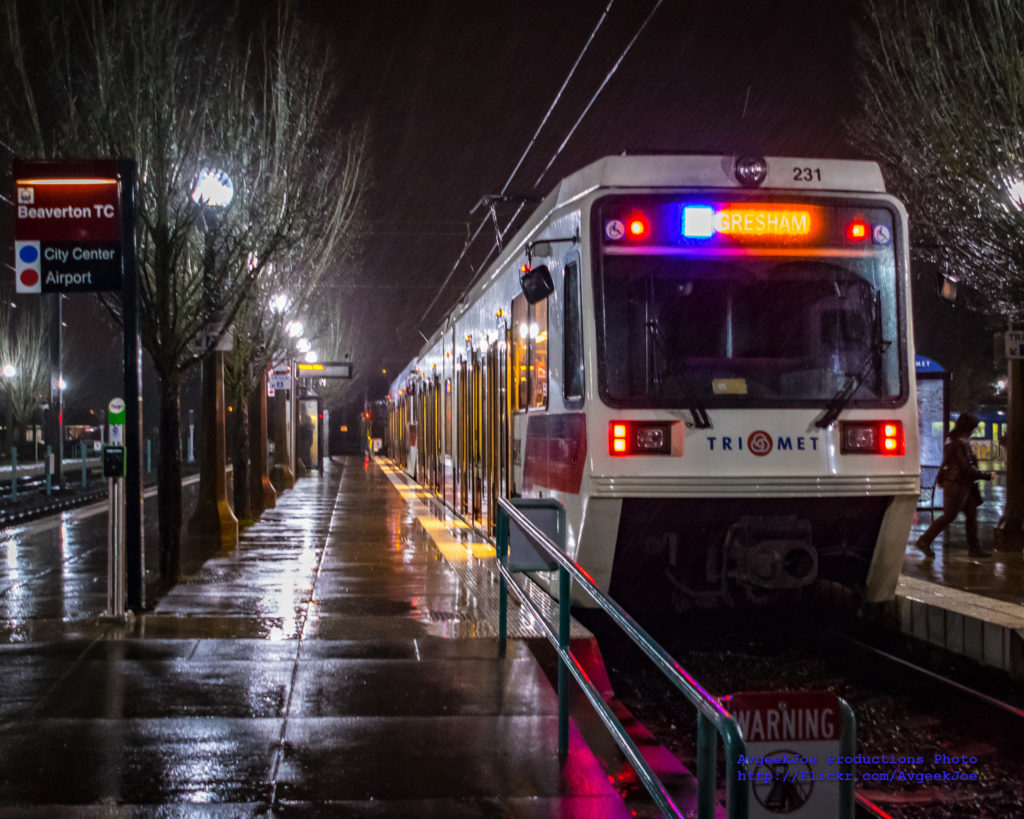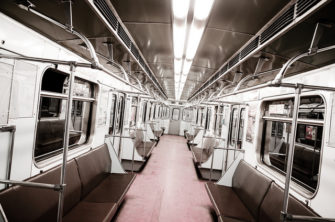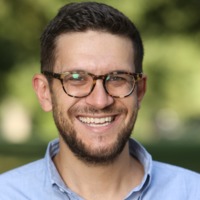
A man is spewing racist and anti-Muslim invective against two young women, one of whom is wearing a hijab. It’s Friday afternoon—rush-hour in Portland, OR—and the train is crowded. Three men move to quiet him. They are pleading with him to settle down, to get off the train. One is making concessions, saying that yes, the man is a taxpayer, but he’s scaring people and he needs to get off. As the train glides towards the next stop, the man pulls a knife. In a flash, he cuts the throats of the three men. Two of them die. The third is still recovering.
It is unimaginable. I’ve ridden that train countless times, jostling with others, happy to be part of the city’s life and, at the same time, looking forward to getting back to my leafy backyard. The reality of it presses into me. The story runs off the page, escaping the banality that envelopes the news. I feel it, the horror of it and the astounding, shining bravery of those who rose to shield the young women.
The suffering of those close to the event is the part that is truly impossible to grasp: the parents and friends of Taliesin Myrddin Namkai-Meche, a recent Reed College graduate; those surrounding Rick Best, a veteran and father of four; the long recovery of Micah Fletcher and his people; the pain endured by the women who were harassed and the fear felt by their families; and the trauma experienced by others on the train. Their story is theirs to tell. Namkai-Meche’s mother, Asha Deliverance, is telling hers with astounding eloquence and humanity. She is imploring us to reflect and to work for change. We must heed her call to think about the future we want. It’s a political question, but only because politics refers to our communal life, to the life of a group of people, moving together through the world, hoping to make it home safe.
—

It hardly bears mentioning that these deaths were part of a pattern of rising white nationalist, anti-Muslim fervor connected to the candidacy and election of Donald Trump to the presidency. The killer’s track record of hate speech makes that much clear. His actions on the train were part of a chain of death threats, mosque burnings, and murders that has snaked across the country since Trump first got on the campaign trail. These events have led some to ask if liberalism—defined roughly as a concern with individual freedom and tolerance—is in its death throes or if it was always unable to live up to the promise of incorporating real difference, cultural, ethnic, or religious.
Somehow, Islam has been tied up in this question for a long time, at least as a theoretical matter. In her masterful book, Thomas Jefferson’s Qur’an, the scholar of Islam, Denise A. Spellberg, unwinds the story of how the founders of the United States understood Islam. For Jefferson, Islam was a litmus test of values. More than a reality, it was an ideal through which one could test the boundaries of toleration. Jefferson supported the tolerance of Islam as proof of his own. Sadly, he does not appear to have imagined that the existence of Muslims in the republic was not just a theoretical future. He likely lived amongst Muslims, or their decedents, who were enslaved on his plantation. Spellberg also writes of a curious figure, John Leland. A friend of Jefferson and a Baptist minister, Leland squinted at tolerance as an inadequate sentiment and argued for fuller bodied embrace of Islam and other religions.
Leland’s is a sentiment I hear with some frequency these days. In my own field of Islamic studies, some scholars hold up Islam as a retort to liberal tolerance and secularism. Often drawing on the work of the Catholic philosopher, Alasdair MacIntyre, these Islamicists point to the Muslim tradition as an alternative to shallow and callow liberalism. For them, a tradition, such as Islam or Catholicism, animates people at the core of their being. They argue that liberals dilute themselves and deceive others when they claim that our deeper needs and identities can be bracketed, allowing us to enter into the public sphere as equal, rational agents, tolerant of difference but only inasmuch as it doesn’t encumber public life. Really, these scholars argue, this “go along to get along” philosophy is always a cypher for the cruel imposition of European and American values on others. The historian and literary critic, Joseph Massad, goes so far as to claim that liberalism must castigate Islam, which it paints in its funhouse mirror image, to constitute itself. Islam, in Massad’s telling, will always be excluded from liberalism.
The reality is that Muslims have participated in liberal societies, including the United States, for a very long time. Anglo-American philosophers may have used tolerance as a hypothetical test to see who could live within the polity. But tolerance also has historicity outside of these theories: it was shaped by the encounters of people over the centuries. In this sense, tolerance isn’t the purview of John Locke and other dead white philosophers. It is one of the evolving ways that people have worked out, amongst themselves, to live and travel side-by-side.
Neither can Islam made into a simple retort to liberalism. Namkai-Meche took the same Introduction to Islam course that I did more than a decade later. The course was taught by Kambiz GhaneaBassiri at Reed College. As GhaneaBassiri said in a recent radio interview, those of us, like Namkai-Meche and myself, who came to the class looking for easy rejoinders to anti-Muslim hate were bound to be frustrated. The course delved deeper than that. By illuminating the nuances of the dizzyingly diverse array of people, ideas, and practices that associate with Islam, the course showed us, implicitly, how small modern American Islamophobia is. We began to understand that Islam is infinitely more complex and the world infinitely bigger than any stereotype would allow.
—
Today, with tolerance threatening to slip from view, we may wonder if liberalism wasn’t so bad after all. Liberal tolerance certainly has been used as a cover for some of the world’s greatest brutalities, as its critics claim. And, they are right to remind liberals of this. But this doesn’t mean liberalism can’t be separated from fascist and colonial violence. Even in liberal philosophy, to tolerate may not be only to ignore. Tolerance might also be an active coming together of three men of different backgrounds to uphold the common good. It is tempting, anyway, to tell that story when thinking of Namkai-Meche, Best, and Fletcher on the train. Of course, that event was more than the unfolding of a pre-determined political philosophy.
Like the spontaneous protests at airports after the Trump administration released its executive order on immigration, the acts of these courageous men were a demonstration that the political exists not in the halls of Congress, the White House, or the writings of theorists. Politics unfold in spaces of transfer and traffic, where people come together for discrete moments. In such transits, new and shared understandings emerge, sustained by the collective desire to continue moving together.
Namkai-Meche’s last words—reported by a woman who pulled off her shirt to tourniquet his wound—were, “Tell everyone on this train that I love them.” We love you, too.

